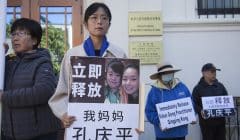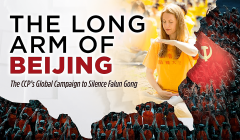Lawyers and Rights Defenders
When the Communist Party launched the campaign against Falun Gong, among the first measures taken was to instruct lawyers not to defend practitioners (news). Indeed, in the early years of the persecution, it was incredibly difficult, if not impossible, for adherents to find genuine legal representation. This has changed in recent years, however, as a generation of lawyers and rights defenders have defied Party directives and taken the cases of Falun Gong adherents, offering advice, representing them in court, and publishing accounts of abuse.
More broadly and at great risk, the lawyers have called into question the fundamental basis of the entire policy against Falun Gong, protesting it as a violation of Chinese citizens’ freedom of belief. The most prominent and outspoken among them has been Gao Zhisheng, who in October 2005 wrote an open letter to Hu Jintao and Wen Jiabao detailing torture suffered by practitioners and calling for an end to the persecution. Over the following months he conducted fact-finding investigations and published his findings, making public the existence of mountainside torture chambers and widespread sexual violence used against practitioners.
Over a dozen other lawyers have since followed in his footsteps, representing Falun Gong adherents in court, appealing to judges to uphold the constitutional right to freedom of belief, and educating fellow Chinese as to the illegality and brutality of the persecution.
In response to their efforts, Gao and other rights defenders have themselves faced persecution at the hands of the authorities – disbarment, detention, beatings, torture and in at least one case, exile. Despite such risks, many have continued to defend Falun Gong, working on a daily basis to uphold justice and seek a timely end to a brutal campaign being carried out against an innocent group of people.
The following are short descriptions and references for several of these lawyers and rights defenders:
Gao Zhisheng
A human rights lawyer with an amazing personal story, Gao Zhisheng became famous after setting precedents in nationally-prominent cases in China. He was named one of China’s top-ten lawyers in 2001 and has worked for the gamut of China’s vulnerable groups—coal miners, home-demolition victims, and house church members.
But it was when Gao, a Christian, started tackling the persecution of Falun Gong that he ran afoul of the regime. In a series of open letters to Party leaders, Gao expressed outrage at the illegality of the campaign against the group and the ghastly torture of its adherents–abuses he discovered when investigating in China’s northeastern region. Gao had hoped that once the top leaders discovered what was happening at local levels, they too would be outraged and act to stop it. What he found instead was that the persecution ran through the entire system and that this machinery would later retaliate against him.
Since 2005, he and his family have been under constant surveillance and in 2008, such tight house arrest that his children have been unable to attend school. In December 2006, Gao was sentenced to three years in prison for “inciting subversion,” but the sentence was subsequently suspended due to international pressure and he was released into house arrest. In late 2007, he was abducted again and reportedly suffered extreme torture in custody.
He has been featured on the cover of the New York Times, was nominated for the Nobel Peace Prize, and is beginning to garner honors such as the American Board of Trial Advocates’ Courageous Advocacy Award.
As Gao remains under house arrest in China, an English translation of his book “A China More Just” (news) —which describes his story, his cases, and the range of social issues China faces— was published in the United States in 2007.
For more information:
-
“An Open Letter to China’s National Peoples’ Congress” December 31, 2004. http://en.epochtimes.com/news/6-3-25/39696.html
-
“Stop Persecuting Believers of Freedom and Mend Your Ties with the Chinese People,” October 18, 2005 http://www.theepochtimes.com/news/5-10-24/33667.html
-
“We Must Immediately Stop the Brutality that Suffocates Our Nation’s Conscience and Morality,” December 12, 2005: http://www.theepochtimes.com/tools/printer.asp?id=35876
Guo Guoting
Guo was a well-known international maritime lawyer who began to take civil rights cases in 2003. Among his clients were Shi Tao (a journalist sentenced to 10 years in prison after Yahoo turned over personal e-mail communications to the Chinese authorities) and Zheng Enchong (a fellow Shanghai attorney and former classmate sentenced to three years in prison).
Guo was among the first Chinese lawyers to take Falun Gong cases, unsuccessfully scouring Shanghai’s various law enforcement organs in search of Huang Xiong who had gone missing. He later sought to represent Qu Yanlai, a graduate student sentenced to five years in prison for practicing Falun Gong. When Guo was unable to even meet with his client after multiple attempts, he posted an article on the internet about the case in February 2005.
Later that month, the Shanghai authorities searched his offices, seizing his license to practice law and his computer. On March 4, Shanghai’s Judicial Bureau banned him from practicing law for one year for “anti-constitutional speeches and acts” and then placed him under house arrest. In May 2005, he managed to flee China for Canada, where he remains in exile.
For more information:
-
“Chinese Attorney Exposes Human Rights Abuses in Shanghai Prison” http://falunhr.org/index.php?option=content&task=view&id=1150&Itemid=50
-
Congressional Executive Committee on China: “Rights Groups: Chinese Authorities Have Suspended the License of Defense Lawyer for Journalists, Activists” http://www.cecc.gov/pages/virtualAcad/index.phpd?showsingle=7714
Li Heping
Li Heping is a partner at Beijing Global Law Firm and has worked as a defense lawyer in a large number of politically sensitive cases—including representing underground Christians, victims of forced eviction, and Falun Gong practitioners.
In March 2008, Li and five other lawyers—Li Xiongbing, Zhang Lihui, Li Shunzhang, Teng Biao, and Wu Hongwei—filed a landmark brief in defense of Falun Gong adherent Wang Bo and her parents in which they laid out a detailed defense of freedom of religion and an analysis of the illegality of the persecution against Falun Gong. More recently, he has represented Beijing adherent Zhang Lianying and Liu Fengmei from Liaoning.
In September 2007, Li was abducted by plainclothes security officers, taken to an unknown location and tortured with electric batons for a period of several hours before being released. The security agents also confiscated some of his legal files and his license to practice law.
For more information:
-
“Chinese lawyers’ motion defends Falun Gong in Court for first time,” Human Rights Law Foundation, October 25, 2007: http://en.epochtimes.com/news/7-10-25/61180.html
-
“Chinese lawyer recounts abduction,” New York Times, October 3, 2007, http://www.nytimes.com/2007/10/03/world/asia/03china.html
-
“Lawyer Li and the goon squad,” Evening Standard, August 19, 2008, http://www.thisislondon.co.uk/standard/article-23541200-details/Lawyer+Li+and+the+goon+squad/article.do
-
Transcript of defense in court of Liu Fengmei, August 2008 (Chinese)






